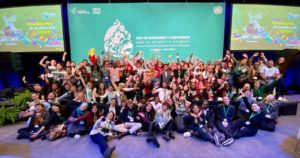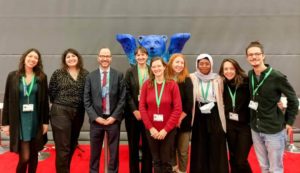The 2022 United Nations Biodiversity Conference took place 7-19 December in Montreal, Canada, with representatives from 188 governments gathering to guide global actions on biodiversity through 2030.
Inger Andersen, the UN Under-Secretary-General and UNEP Executive Director spoke out about what needed to be achieved:
“Nature and biodiversity is dying the death of a billion cuts. And humanity is paying the price for betraying its closest friend. In the words of the UN Secretary-General, “we are committing suicide by proxy”. This Conference of the Parties must secure the future of our planetary life support system.”
Chaired by China and hosted by Canada, COP 15 resulted in the adoption of the Kunming-Montreal Global Biodiversity Framework (GBF) on the last day of negotiations. The GBF aims to address biodiversity loss, restore ecosystems and protect indigenous rights. The plan includes concrete measures to halt and reverse nature loss, including putting 30 per cent of the planet and 30 per cent of degraded ecosystems under protection by 2030. It also contains proposals to increase finance to developing countries.
With the event ending on this landmark agreement to protect 30% of the world’s lands, coastal areas and inland water, we were interested to found out what Early Career Ocean Professionals in attendance thought about this accomplishment and find out their hopes for the future, with regards to Ocean Biodiversity.
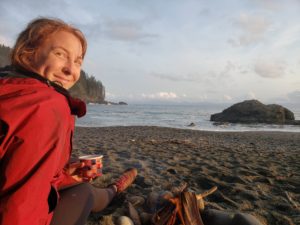
Kara Guloien, Canada:
“I am a climate activist, waste literacy advocate, and marine conservation biologist from Vancouver, British Columbia. I am passionate about mobilizing youth to have impact at scale and I am deeply committed to resolving equity issues within the environmental sector. I am also the co-founder of Plastic Free BC: a non profit organization which fosters the development of the circular economy by improving waste literacy and eco-conscious citizenry.
My journey in protecting the oceans began during my childhood on my father’s fishing boat. My grandfather and great-grandfather had also been fishermen, and we were always taught to respect the ocean and to treat it with stewardship.
Becoming a trained marine biologist on the west coast of British Columbia, I’ve been fortunate to have the opportunity to experience our planet’s rich and diverse marine ecosystems firsthand. I’ve also witnessed how declines in ecologically and culturally relevant species, such as salmon, have impacted biodiversity of coastal ecosystems in Canada.
Entering COP15, my goal was to bring forth strategies for improving the management of our oceans. However, it was bewildering to experience how seldom the ocean was discussed at the table at all. The ocean holds 80% of the planet’s biodiversity. There is no path to net zero without the ocean. There is no food sovereignty without the ocean. There is no sustainable development without the ocean. As a result, it was discouraging to see negligible phrasing specific to ocean conservation within the text, but nevertheless, the importance of being present within this space could not have been clearer.
Alongside my counterparts from the Global Youth Biodiversity Network, I spent my time being pulled in all directions – meeting with negotiators and decision makers from various national governments, tracking working groups, and speaking at media events. It was humbling to be so actively engaged by high-level representatives and youth delegates alike. I know I was not the only youth feeling the weight and urgency of voicing our perspectives, as so many of us were so vigorously in action. Without question, youth delivered on holding decision-makers accountable, and the impacts of their voices highlight why our environment is in desperate need of further youth engagement.
After weeks of drama, grief, and anticipation, the congress triumphantly closed with a Global Biodiversity Framework. Although the targets are perhaps not as robust as we had wished, they are, in many ways, better than we expected. I leave COP15 extremely optimistic from witnessing the intensity and drive of those committed to restoring and protecting the planet’s biodiversity.
Looking beyond COP15, governments will begin to implement the framework – but this agreement will only be effective if it is supported by citizens, NGOs, and corporations. So, I hope to see greater public engagement towards the biodiversity conservation movement. I hope to see greater appreciation and commitments towards marine restoration and protection. I hope to see youth making waves, driving ambition, and holding decision makers accountable.”
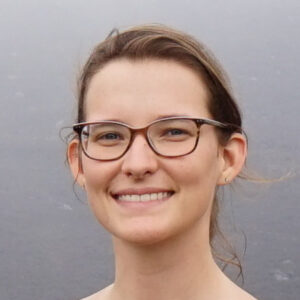
Marie-Morgane Rouyer, France:
“I came to COP15 as part of the delegation of the Global Youth Biodiversity Network (GYBN), of which I am an active member of its European chapter. My role in the delegation was to help coordinate the French-speaking group, especially linked to the policy activities we were undertaking, such as following the negotiations, creating links between youth delegates and their national representatives and presenting our priorities to country delegates.
With other GYBN members, we actively followed the marine-related negotiations (among other topics). What I am particularly proud is to see how well we worked together from scratch thanks to all the coordinated effort of our team, learning a lot in just a few days: how the negotiations are working, how to work with Parties before, during and hopefully after the COP, how to spread our messages. Thanks to that we proposed (among other things) that youth (which include many early-career ocean scientists) were included in a paragraph on capacity-building, experience-sharing and partnership activities as a specific category of stakeholder to involve.
I was surprised to see how some countries are being very inclusive of young people and unfortunately how others are not. What I was more disappointed about was to see how the UN processes can be unfair between country delegations: language as a barrier, inequity in capacity to attend these important negotiations between countries.
The Global Biodiversity Framework (GBF) that came out of COP15 is not perfect but a lot of efforts have been put into it to be able to reach a consensus between Parties. There are reasons to be hopeful as Indigenous People and Local Communities, Women and Youth are much more included in the Framework as stakeholders as they were in the Aichi targets (thanks to all the great work from the different Major Groups representing them). However, we know very well that there is still not enough money to implement the GBF to its fullest (although, there is more compared to the previous framework) and the implementation phase that starts now is key to ensure it does much better in reaching its objectives than the Aichi targets did. One key takeaway I will take from this incredible experience is that there is an empathetic, caring, and value-based community (GYBN) that is working across scales to bring transformative change into our society and will do its very best to help implement the framework through young people.”
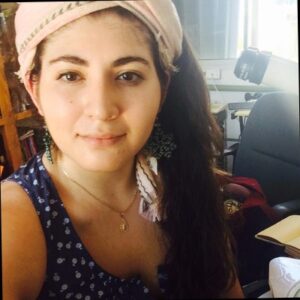
Pamela Tapia, Mexico:
I am Pamela Tapia, a Mexican ECOP with experience in marine ecology and conservation, I direct the citizen participation program at the Kalanbio association, focused on marine conservation research and because of my work with citizen science I was chosen by Mexican civil society to be part of the official Mexican delegation at COP15.
My main function at COP 15 was to provide advice and support to the negotiators on the issues of: EBSAs, conservation and sustainable use of marine and coastal biodiversity, gender action plan and GBF.
The experience has been very enriching, as a young researcher we are a direct window for the negotiators to the local and social scientific panorama, we can talk about our local problems, but also about the solutions and research that we carry out, for me, being in these meetings allows me to incorporate the global approach and combine future projects and research to the global goals.
It is not easy to leave academia and enter diplomacy, the first approach is very tough, there is a whole new language to learn based on acronyms and negotiations, besides having to put extra effort to over-prove my abilities and fight against a macho system, I am fortunate to have mentors who accompany me and share my vision: that of a science-policy interface that is enriched by incorporating traditional knowledge to allow us informed and inclusive decisions, always with a gender perspective.
We cannot leave aside the social inequalities that must be fought and gender equity is a goal that should be in every plan that involves development, I am very proud of my participation and of promoting with the Mexican delegation the gender action plan, as well as target 23.
As an ECR, from my shores I see overfishing, illegal fishing, red tide, huge amounts of sargassum, plastics, invasive alien species and ocean management that could be improved. I also see the problem of unpaid or poorly paid jobs when leaving academia, entire sectors in which women are especially violated and invisible, and that science advances at different speeds in the global north and south, there is talk of real time sequencing as a fact and I wonder what sample I could send to another country for analysis.
The ocean unites us, we can find inspiration from colleagues in different parts of the world and that connects us, it reminds us that we inhabit a great home, in the most human sense, it teaches us to be empathetic. Here we recognize ourselves, there are many of us who have left our sea, our birds, our communities, to find the best way to save our biodiversity.
I hope that this new global framework for biodiversity will be a new chapter that takes into account the past that we are trying to correct, that science will be more present in these forums, that our research data will be open… I would like science to involve more intergenerational dialogues, we cannot wait to have a doctorate to deserve to give our opinions… I would like science to involve more intergenerational dialogues. We cannot wait to have a phD to deserve to give our opinions, we know the tremendous responsibility that our words have from now on.”
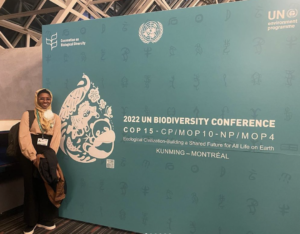
Adiza Abdul-Rafiu Mohammed, Ghana:
“Over the past few months several conferences have taken place with Governments, NGOs, Activist and International Organizations fighting in their own small ways to make our world a better place. Those fighting for a just and sustainable environment are the same people creating the mess and destroying our environment. However, every year, the UN and governments meet in a fancy hotels and conference rooms and spend lots of money and resources in the hope of bringing solutions to our environmental problems.
Youths, rural community people and indigenous communities are the most affected when it comes to biodiversity loss, climate change and environmental issues but these people are given the less opportunities to participate and share their voices, struggles and opinions through which change can be possible. Most people from these groups, and especially people from the rural communities, find it difficult to pay for their flight, accommodation and even daily stipends in other to participate in these high level activities. We want to create change but we are not ready to make those sacrifices for change.
At the last UNFCCC meeting, little progress was made. All Parties provided information on mitigation targets or mitigation co-benefits resulting from adaptation actions and/or economic diversification plans. The mitigation targets range from economy-wide absolute emission reduction targets to strategies, policies, plans and actions for low-emission development. And at the end of it a historical decision was made to fund countries for loss and damage which is due to effects of climate change, caused by the developed countries in the developing countries. But to what ends? This is a great achievement but this achievement will not help address the ill effects caused by climate change.
Nigeria, Somalia and some few African countries are experiencing the consequences of climate change right now and no help is being rendered to them. The world is 70% covered with water and it has more species dwelling in it compared to land, which has about 7.3 billion people and 1 trillion things living on earth. The fact is that most of the ocean is not explored and not even seen by the eyes yet. Only about 5% of the ocean has been explored and charted by humans. Little information is made known about our ocean to the public, and there’s very little or no education at all when it comes to ocean related activities and issues. Much concentration is given to biodiversity and climate actions, forgetting that the Ocean is as important as the rest of the other activities. During COP15, there was very little conversation around the Oceans, which I realized after the 30×30 framework, there was little to no space in the global biodiversity framework. Also, wealthier nations pledged to financially support developing countries to fight biodiversity crisis with the same promise was made at the COP27 in Egypt. Hopefully we will hold the wealthy nations accountable now.
One interesting thing to come out of COP15, is how most countries have set out ambitious targets to be achieved by 2030; in order to live in harmony with nature by 2050. We need to have dialogue to address how we can protect our Ocean and how we can also protect people who’s life depends on the Ocean to survive. The UN has made conscious effort by introducing the UN Ocean Decade program in order to bring students, researchers and scientists together to help address the issues affecting our oceans but when it comes to high level meetings, very little regards is given to that. Conversations around marine and ocean is limited during the UNFCCC and the CBD events. Although there are some high level meetings like the UN Water Conference and also UN Ocean Decade Conference, people are less aware of it and even people working with the Ocean and studying Ocean related programs at University do not get the chance to participate, because they are either not aware, invited or do not have the funds to attend such programs. Several conversations are ongoing which are meant to address issues affecting our world. But these conversations are being made by same people who put us in this mess and they are not ready and willing to allow the Youth to take the mandate and create the change needed for a better environment and Ocean. Now COP15 is over, so what next?
A huge thank you to our four ECOPs for sharing their insights and thoughts; you can learn more about the COP15 outcomes here.
